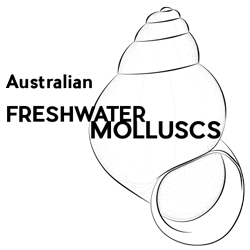
Species included in the B. bellii group are small to medium-sized (2.3-3.0 mm in length), ovate-conic to ovate and usually have a columella swelling. The penis is simple (as in B. bellii and B. protuberata) or with a lenticular brown gland in the middle. Species in this group are restricted to north-western Tasmania.
This species differs from the similar Beddomeia mesibovi, B. topsiae, B. salmonis and B. fultoni [1] [2][1] [2] in having a shell with a more prominent shoulder.
Beddomeia gibba Ponder & Clark, 1993
Class Gastropoda
Infraclass Caenogastropoda
Order Littorinida
Suborder Rissoidina
Superfamily Truncatelloidea
Family Beddomeiidae
Original name: Beddomeia gibba Ponder & Clark, 1993. In Ponder, W. F., Clark, G. A., Miller, A. & Toluzzi, A. 1993. On a major radiation of freshwater snails in Tasmania and eastern Victoria - a preliminary overview of the Beddomeia group (Mollusca: Gastropoda: Hydrobiidae). Invertebrate Taxonomy 7: 501-750.
Type locality: Small seep, on Salmon River Road, 0.2 km N of Lerunna Road, Tasmania (41°02'33" S, 144°52'04" E).
Crawling amongst small sedges and the wet surface of the mud in shallow water in the seepage. Egg capsules presumably like those of other species of Beddomeia - dome-shaped, with broad attachment base, covered with minute, mainly white sand grains and other fragments and containing a single egg. Development direct.
As for type locality.
All species of Beddomeia are geographically isolated and have restricted ranges.
This species is on the Tasmanian Threatened Species Protection Act 1995 as Rare (small population at risk).
Ponder, W. F., Clark, G. A., Miller, A. C. & Toluzzi, A. (1993). On a major radiation of freshwater snails in Tasmania and eastern Victoria: a preliminary overview of the Beddomeia group (Mollusca: Gastropoda: Hydrobiidae). Invertebrate Taxonomy 7: 501-750.